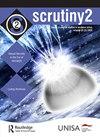Voice/Body/Skin: (Dis)locating Belonging in Antjie Krog’s Country of My Skull, A Change of Tongue, and Begging to Be Black
IF 0.1
0 LITERATURE
Scrutiny2-Issues in English Studies in Southern Africa
Pub Date : 2018-01-02
DOI:10.1080/18125441.2018.1508246
引用次数: 0
Abstract
ABSTRACT In this article I seek to reflect on the progression of Antjie Krog’s use of the tropes of “the voice”, “the body”, and “the skin” over the course of her three literary journalism texts, Country of My Skull (2002), A Change of Tongue (2004), and Begging to Be Black (2009). I use the term “literary journalism” to foreground the generic instability of Krog’s texts, which weave together journalism, memoir, travel writing, social commentary, the poetic, and fictional elements. In Krog’s writing, the form, style, and structure of her texts are as important in the process of creating meaning as her language choices and content. By writing at the messy, contested border between literature and journalism, Krog is able to explore the intangible and affective aspects of identity and belonging. I conclude by suggesting that, as Krog moves from a preoccupation with “the voice” and “the body” to the concept of “skin”, she is able to draw on the notion of the “in-between” to address her most pressing concerns surrounding questions of white identity and national belonging.声音/身体/皮肤:(Dis)定位于安特杰·克罗格的《我的头骨之国》、《换舌头》、《乞求成为黑人》
摘要本文旨在反思克罗格在《我的头骨之国》(2002年)、《舌战》(2004年)和《乞求成为黑人》(2009年)这三部文学新闻文本中,对“声音”、“身体”和“皮肤”比喻的运用过程。我用“文学新闻学”一词来突出克罗格文本的普遍不稳定性,这些文本将新闻学、回忆录、旅行写作、社会评论、诗歌和虚构元素交织在一起。在克罗格的写作中,文本的形式、风格和结构在创造意义的过程中与她的语言选择和内容一样重要。通过在文学和新闻之间混乱、有争议的边界上写作,克罗格能够探索身份和归属的无形和情感方面。最后,我建议,随着克罗格从专注于“声音”和“身体”转向“皮肤”的概念,她能够利用“中间人”的概念来解决她对白人身份和民族归属问题最紧迫的担忧。
本文章由计算机程序翻译,如有差异,请以英文原文为准。
求助全文
约1分钟内获得全文
求助全文
来源期刊
CiteScore
0.50
自引率
0.00%
发文量
10
期刊介绍:
scrutiny2 is a double blind peer-reviewed journal that publishes original manuscripts on theoretical and practical concerns in English literary studies in southern Africa, particularly tertiary education. Uniquely southern African approaches to southern African concerns are sought, although manuscripts of a more general nature will be considered. The journal is aimed at an audience of specialists in English literary studies. While the dominant form of manuscripts published will be the scholarly article, the journal will also publish poetry, as well as other forms of writing such as the essay, review essay, conference report and polemical position piece. This journal is accredited with the South African Department of Higher Education and Training.

 求助内容:
求助内容: 应助结果提醒方式:
应助结果提醒方式:


